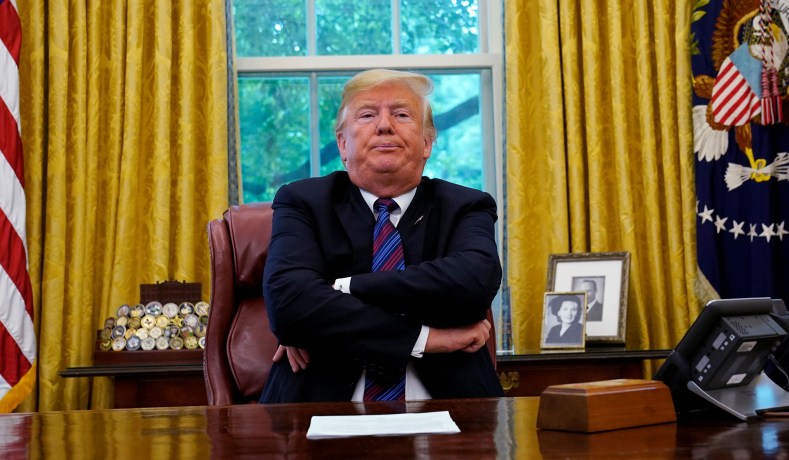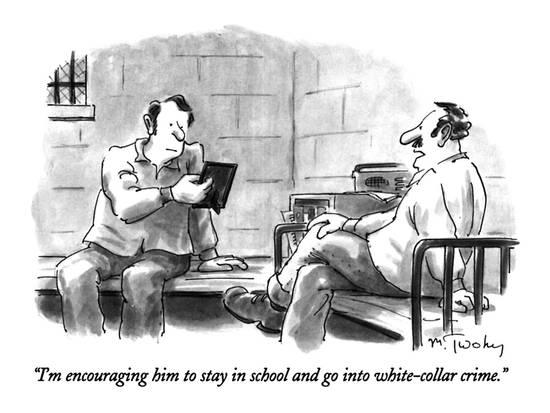Among the several deranged things Trump tweeted this morning was this:
What’s going on at @CNN is happening, to different degrees, at other networks – with @NBCNews being the worst. The good news is that Andy Lack(y) is about to be fired(?) for incompetence, and much worse. When Lester Holt got caught fudging my tape on Russia, they were hurt badly!
— Donald J. Trump (@realDonaldTrump) August 30, 2018
I have no memory of Lester Holt getting caught “fudging” any tape. Trump appears to be refering to the May 2017 interview in which Trump admitted he fired James Comey because of “this Russia thing.” NBC News has the entire, unedited video online.
It’s kind of fascinating that the Id in the White House brought this up today, more than a year later. Greg Sargent writes that people around The Creature believe he is vulnerable to impeachment on obstruction of justice charges, and I bet someone tried to explain to him why what he said to Lester Holt would become Exhibit A.
Naturally, in the Creature’s tiny mind, the facts must be re-arranged so that he never said it.
I believe I’ve already said that I doubt the House Democrats, assuming they take over the majority next year, will make a serious attempt to impeach Trump as long as there’s no chance he would be removed from office by the Senate. Nor should they, until enough Republican senators are on board with getting rid of him. But they will do everything short of that to destroy him politically, starting with releasing his tax returns. Heh.
The minions and toadies trying to protect The Creature are worried that he is not prepared for what’s likely to come at him from a Democratic House:
President Trump’s advisers and allies are increasingly worried that he has neither the staff nor the strategy to protect himself from a possible Democratic takeover of the House, which would empower the opposition party to shower the administration with subpoenas or even pursue impeachment charges.
Within Trump’s orbit, there is consensus that his current legal team is not equipped to effectively navigate an onslaught of congressional demands, and there has been broad discussion about bringing on new lawyers experienced in white-collar defense and political scandals. …
…Â Still, Trump has not directed his lawyers or his political aides to prepare an action plan, leaving allies to fret that the president does not appreciate the magnitude of what could be in store next year. …
… One adviser recalled recently telling Trump, “They will crush you if they win. You don’t want them investigating every single thing you’ve done.â€
The article goes on to say that Trump hasn’t seemed to have accepted the probability that the Dems will re-take the House. But we know it worries him, because he’s such a totally unfiltered id. His finances may be hidden, but whatever goes on in his psyche is as obvious as a wart on a nose.
Take Trump’s recent White House meeting with evangelical leaders, for example.
US President Donald Trump, facing scrutiny for hush money payments to a porn star and a former Playboy model, pleaded with evangelical leaders for political help during closed-door remarks on Monday, warning of dire consequences to their congregations should Republicans lose in November’s midterm elections.
“This November 6 election is very much a referendum on not only me, it’s a referendum on your religion, it’s a referendum on free speech and the First Amendment. It’s a referendum on so much,” Trump told the assemblage of pastors and other Christian leaders gathered in the State Dining Room, according to a recording from people in the room.
“It’s not a question of like or dislike, it’s a question that they will overturn everything that we’ve done and they will do it quickly and violently. And violently. There is violence. When you look at Antifa — these are violent people,” Trump said, describing what would happen should his voters fail to cast ballots. “You have tremendous power. You were saying, in this room, you have people who preach to almost 200 million people. Depending on which Sunday we’re talking about.”
Never mind that the violence part is nonsense. Never mind that Al Gore got into all kinds of trouble for making campaign phone calls from the White House, and here Trump was holding a campaign rally in the Oval Office. Let us put that aside. What’s fascinating about this is that it tells us what’s weighing on Trump’s psyche. He’s afraid. He wants his buddies the evangelical leaders to affirm his fear and make the scary things go away.
He showed us another glimpse into the Twilight Zone in his head by claiming to the evangelical leaders he had “got rid of” the Johnson Amendment, which bans churches from endorsing candidates.
“Now one of the things I’m most proud of is getting rid of the Johnson Amendment,” the president said, according to NBC News. “That was a disaster for you.”
But the law actually remains in place after an attempt to kill it last year was unsuccessful.
He did sign an executive order last year that eased enforcement of the Amendment, and maybe he thinks that was all it took to “get rid” of it. I wanted to draw one of those consequence trees about what this claim might be telling us. At the top it would ask if Trump truly believed his executive order got rid of the Amendment. If Yes, that would lead to the conclusion he is mentally impaired; if No, he believed no one in the room would notice he was lying. And what conclusions might you draw from that? And that he was in the Oval Office urging evangelical leaders to break the law?
For some previews of Trump’s continuing psychological meltdown, see No Matter How Bad It Gets, Trump Will Never Give Up.




